The birth of the Vietnamese Constitutions
(Baonghean.vn) - Up to now, in the history of our country's constitution, there have been 5 Constitutions promulgated: the 1946 Constitution, the 1959 Constitution, the 1980 Constitution, the 1992 Constitution (amended and supplemented in 2001) and the Constitution currently in effect is the 2013 Constitution.
Each Constitution is associated with a stage of development in the history of the national revolution. Let's learn about the historical context as well as the nature of Vietnam's Constitutions.
1. 1946 Constitution
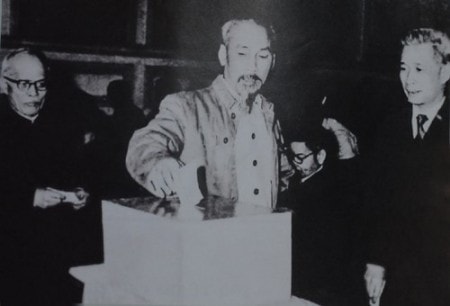 |
| Uncle Ho cast the first vote in the election of the 1st National Assembly. Photo: Archive. |
After the success of the August Revolution, on September 2, 1945, President Ho Chi Minh read the Declaration of Independence, giving birth to the Democratic Republic of Vietnam.
On September 3, 1945, at the first meeting of the Provisional Government, President Ho Chi Minh raised the issue of the need for a democratic Constitution for Vietnam.
Despite the extremely difficult conditions of the early days of independence, the Provisional Government at that time still successfully organized the General Election to elect the first National Assembly on January 6, 1946.
After 10 months of active preparation, under the close direction of President Ho Chi Minh, on November 9, 1946, the 1st National Assembly (2nd session) officially passed the first Constitution of our country (with 240/242 votes in favor), which was the 1946 Constitution.
The 1946 Constitution was a strong legal affirmation of the national sovereignty of the Vietnamese people, the independence and territorial integrity of the Democratic Republic of Vietnam. However, due to war conditions, the 1946 Constitution was not officially promulgated. However, the spirit and content of the 1946 Constitution were always applied by the Provisional Government and the Standing Committee of the National Assembly to govern the country. The constitutional ideology of the 1946 Constitution was always inherited and developed in later Constitutions.
2. 1959 Constitution
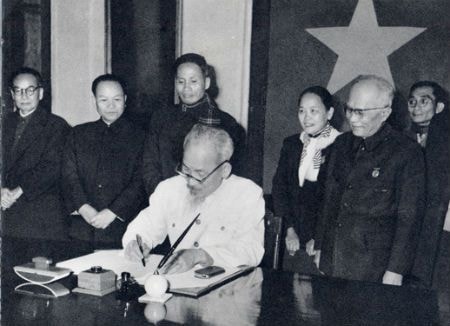 |
| President Ho Chi Minh signed the decree promulgating the 1959 Constitution. |
On May 7, 1954, the historic victory of Dien Bien Phu created the premise for the Geneva Agreement (signed by the parties on July 20, 1954), the first international document, declaring respect for the independence, sovereignty, unity and territorial integrity of Vietnam.
However, soon after, with direct support from the United States, the Ngo Dinh Diem government in South Vietnam refused to implement the Geneva Agreement, plotting to permanently divide Vietnam.
The above-mentioned changes in the political and social situation made it impossible for the 1946 Constitution to be applied nationwide. On the other hand, many provisions of the 1946 Constitution were no longer suitable for the revolutionary conditions of our country in the North at that time.
Therefore, the request to amend the 1946 Constitution was raised. To carry out this task, the Government established a Constitutional Amendment Committee with 28 members, headed by President Ho Chi Minh.
On April 1, 1959, the Draft of the new Constitution was announced for public discussion and comments. On December 31, 1959, at the 11th session, the 1st National Assembly passed the new Constitution to replace the 1946 Constitution; and on January 1, 1960, President Ho Chi Minh signed the order to announce this Constitution - the 1959 Constitution.
3. 1980 Constitution
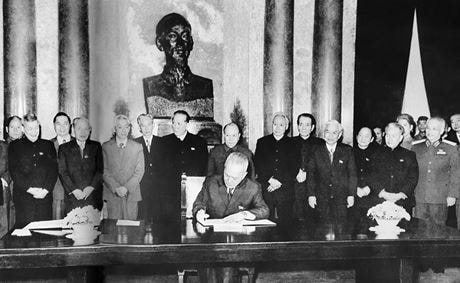 |
| Acting President Nguyen Huu Tho signed the Decree promulgating the new Constitution, December 1980. |
April 30, 1975 marked a brilliant milestone in the history of the Vietnamese nation, the country was completely unified, the country was reunited. On April 25, 1976, the General Election according to the principle of universal suffrage elected 492 National Assembly deputies (term VI).
From June 24 to July 3, 1976, the 6th National Assembly held its first session. At this session, on July 2, 1976, the National Assembly decided to change the name of our country to the Socialist Republic of Vietnam; at the same time, it issued a Resolution on amending the 1959 Constitution and established a Constitutional Drafting Committee consisting of 36 people, with comrade Truong Chinh - Chairman of the National Assembly Standing Committee as Chairman of the new Constitutional Drafting Committee.
By August 1979, the new Draft Constitution was submitted for public opinion nationwide. On December 18, 1980, at the 7th session of the 6th National Assembly, the Constitution of the Socialist Republic of Vietnam was unanimously approved.
With the 1980 Constitution, for the first time the leadership role of the Communist Party of Vietnam was stipulated in Article 4, this is the main factor deciding all victories of the Vietnamese revolution in the transition period to socialism.
4. 1992 Constitution
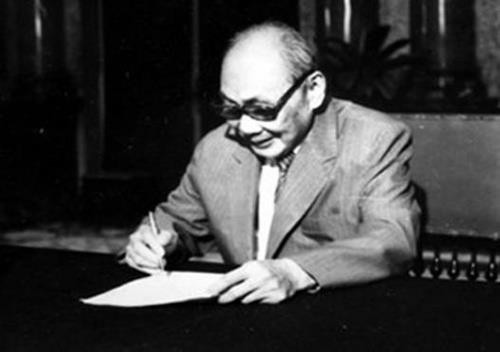 |
| On December 22, 1988, at the 3rd session of the National Assembly (VIII tenure), a Resolution was issued to establish a Constitutional Amendment Committee consisting of 28 comrades, chaired by Chairman of the State Council Vo Chi Cong. In the photo: Comrade Vo Chi Cong signed the decree promulgating the 1992 Constitution. |
In the late 80s of the 20th century, due to the influence of the international communist and workers' movement falling into decline, the socialist countries in Eastern Europe and the Soviet Union collapsed, our country fell into a serious economic crisis.
The 6th National Congress of the Communist Party of Vietnam (December 1986) set out a renovation policy with many important policies and solutions to maintain political stability and continue socio-economic development; in that context, many provisions of the 1980 Constitution were no longer suitable to the requirements of nation building in new conditions.
On December 22, 1988, at the 3rd session of the National Assembly (VIII tenure), a Resolution was issued to establish a Constitutional Amendment Committee consisting of 28 comrades, with Chairman of the State Council Vo Chi Cong as Chairman of the Constitutional Amendment Committee.
On April 15, 1992, based on the synthesis of opinions from the people of the whole country, the Draft of the new Constitution was approved by the 8th National Assembly (at the 11th session). The 1992 Constitution is known as the Constitution of Vietnam in the early period of the renovation process.
On December 25, 2001, at the 10th session, the 10th National Assembly passed Resolution No. 51/2001/QH10 on amending and supplementing a number of articles of the 1992 Constitution of the Socialist Republic of Vietnam.
5. Constitution 2013
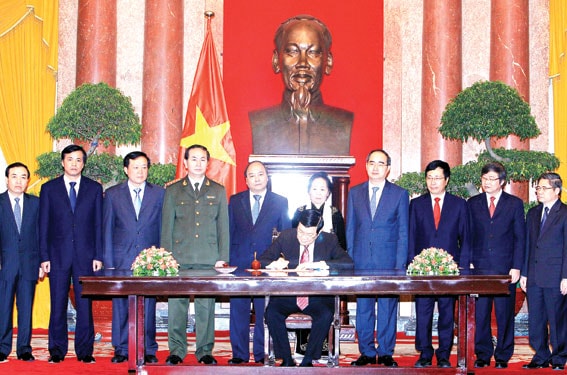 |
| On December 8, 2013, at the Presidential Palace, President Truong Tan Sang signed the Order promulgating the Constitution of the Socialist Republic of Vietnam and the Order promulgating the Resolution stipulating a number of points for implementing the Constitution of the Socialist Republic of Vietnam. |
On the basis of the Platform for national construction in the transitional period to socialism in 1991 (supplemented and developed in 2011) of the Communist Party of Vietnam, together with the results of summarizing the practical results over 25 years of implementing the comprehensive renovation of the country, it was required to amend and supplement the 1992 Constitution; in order to more fully and deeply institutionalize the viewpoints of our Party and State on upholding people's sovereignty, promoting socialist democracy and ensuring that all state power belongs to the people.
On August 6, 2011, at the first session of the 13th National Assembly, Resolution No. 06/2011/QH13 was passed to establish the 1992 Constitution Amendment Drafting Committee consisting of 30 members, with comrade Nguyen Sinh Hung - Chairman of the National Assembly as Chairman of the Committee.
After 9 months (from January to September 2013) of collecting opinions from the people nationwide and overseas Vietnamese, on November 28, 2013, at the 6th session, the 13th National Assembly officially passed the Constitution of the Socialist Republic of Vietnam - the 2013 Constitution.
On December 8, 2013, the President signed the Order to promulgate the Constitution. The 2013 Constitution took effect from January 1, 2014. This is the Constitution of the period of continued national renewal in the cause of national construction, defense and international integration.
Peace
(Synthetic)
| RELATED NEWS |
|---|

